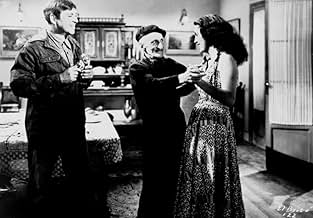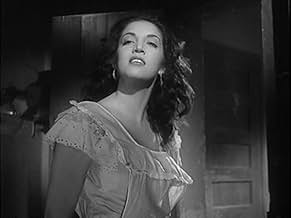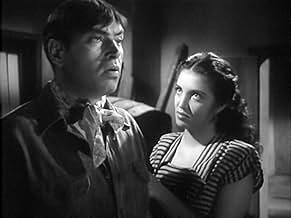Füge eine Handlung in deiner Sprache hinzuA tough young man who helps to evict poor people from their houses falls in love with a girl who lives with her father in a building that's about to be demolished.A tough young man who helps to evict poor people from their houses falls in love with a girl who lives with her father in a building that's about to be demolished.A tough young man who helps to evict poor people from their houses falls in love with a girl who lives with her father in a building that's about to be demolished.
- Auszeichnungen
- 1 Gewinn & 2 Nominierungen insgesamt
- Meche
- (as Rosa Arenas)
- El Cojo - Tío de María
- (as G. Bravo Sosa)
- Vecina
- (Nicht genannt)
Empfohlene Bewertungen
"El Bruto" is no exception and it is a strong combination of a surreal melodrama and political film which could also be viewed as a modern retelling of the Frankenstein's story. Pedro "El Bruto" is a young tough slaughterhouse laborer who is exploited by a tyrannical landowner who may be his father and to whom he is very loyal. He is eager to help Don Andres to evict the poor tenants form their houses that belong to Don Andres. Pedro is a simple man who was not used to think a lot and analyze the motivations of the others but he will learn and his eyes will open. Pedro will become a not so obscure object of desire of two women, passionate and strong-willed Paloma, the young wife of Don Andres and the kind and gentle Meche, whose father Pedro accidentally kills while doing the job for Don Andres. As is supposed to be in the melodrama, one of the women is scorned and hell hath no fury as she does and the inevitable ending is coming. The very last shot of the movie with its enigmatic irony is pure Bunuel - only he would finish the film the way he did.
Pedro Armendariz uses his enormous star power to give an unforgettable performance as the brute, a 'slow thinker' as he calls himself--he's a Victor McLaglen type only a lot sexier. Katy Jurado, the female equivalent of Armendariz in popularity, is wonderfully mendacious here. And Andres Soler as the grasping landlord reminds me so much of Walter Huston; they could have been brothers. Enjoyable to watch, because of the performances, just don't expect the usual Bunuel touches.
Pedro goes to the community in the night and he hits the weak Carmelo that has a bleed and dies. When Pedro meets Carmelo's daughter Meche (Rosa Arenas), he falls in love with her and she moves to his house. But the jealous Paloma does not want to give up on Pedro. "El Bruto" is a melodramatic film by Luis Buñuel with the background of a fight of classes between an abusive and powerful landlord and his poor tenants. In this film, Buñuel does not use his "trademark" – the surrealism – and the story is very simple but engaging. The screenplay is very well written and the direction and performances are top-notch. My vote is seven.
Title (Brazil): "O Bruto" ("The Brute")
The film follows an uninspired tale of eviction of tenants by Don Andres, and El Brudo - Pedro - is hired to rough em up, and stop those "revolutionaries" from stirring up trouble. Perhaps Bunuel was making a commentary about Franco's Spain with such references, but any analogy is lost in the mire of an all-too-predictable plot. The details are not really worth mentioning, on account of their banality.
What, then, saves this film from registering a 3 or worse on my scale? Well, while the film seems at first aggravatingly conventional, there are enough subversive digressions from the genre (beast-mollified-by-virtuous-beauty) that makes you rethink the point of the entire film. First of all, there's the matter of perspective - we are all used to seeing Film Noir heavies take the protagonist/troublemaker aside with a little "message" from the boss. This time, though, we are asked to sympathize with the heavy's side. Sure, it's been done elsewhere (The Godfather trilogy comes to mind), but not with, as in Armendariz's performance as Pedro, intensity reminiscent of Marlon Brando as Tennessee Williams' Stanley Kowalski.
Otherwise, a lingering question of motive remains. It is not a simple, beast-man changes his ways and saves the day story, because Pedro's motivation for change seems to be attraction to Meche, not benevolence towards the lowly tenants. Does that make him a selfish, animal man? Or does it actually reveal his humanity, above that of the loveless Don Andres and Paloma? In the end, Pedro doesn't change his nature, but a certain part of his nature - that of attraction - gets the better of him.
The final image of the film is also deliciously enigmatic: Paloma gazing - fearfully? anxiously? - at a dark hen that defies interpretation. Perhaps I missed a plot detail about that hen - was it the same one that was a gift from Pedro to Meche? then perhaps she is jealous - but more likely, it is a statement of rebellion against Paloma's otherwise static character type. She seems to be have been involved with some potent set pieces earlier (the flowers to be cut, representing tenants; the meat to be cut, representing the subtlety of seduction).
We are not meant to leave fully knowing or understanding either Paloma or Pedro (sadly, Meche remains 1-dimensional), and enough scenes are introduced that challenge our preconceptions about type characters that makes the story surprisingly compelling.
Wusstest du schon
- WissenswertesDuring filming, actor Pedro Armendáriz strenuously refused to wear short-sleeved shirts, claiming they were made for pedophiles.
- Zitate
Pedro - El Bruto: You have such ways with me. It's true.
Paloma: Come and look. Here are your clothes, clean and mended. Fix yourself up a little. You always look so sloppy and your hair is always messy. And you show off with an open shirt.
Pedro - El Bruto: That's not true. I lost a button.
Paloma: I'll fix it. It's incredible. Such manliness and yet you're such a baby. You don't seem to be a real man. When Don Andrés scolds you,u you look for a back to hide behind. I could did laughing.
Pedro - El Bruto: Don't say that, ma'am. I love and respect him because he has known me since I was a baby. My mother was Don Pepe's maid. The old man. He was always good to us. He sent me to school, and would hit me if I did something wrong. But when he was in a good mood he gave me candy and allowed to listen to his clock. Somebody once said he was my father. I had a fight over it with some other kids. If he was my father... I'm sure he'd tell me. Don't you think?
Paloma: [El Bruto forces himself upon Paloma] Leave me alone. Let me go.
Pedro - El Bruto: I'll teach you to stop playing with me.
Paloma: You want me to call Andrés? You bastard! What did you think? That I'd allow you to touch me with your dirty hands?
Pedro - El Bruto: Forgive me. I thought that...
Paloma: What, idiot?
Pedro - El Bruto: That you liked me.
Paloma: But you forget something very important. That I have to be willing also.
Top-Auswahl
- How long is The Brute?Powered by Alexa
Details
- Erscheinungsdatum
- Herkunftsland
- Sprache
- Auch bekannt als
- The Brute
- Drehorte
- Produktionsfirma
- Weitere beteiligte Unternehmen bei IMDbPro anzeigen
- Laufzeit1 Stunde 21 Minuten
- Farbe
- Seitenverhältnis
- 1.37 : 1
Zu dieser Seite beitragen
























